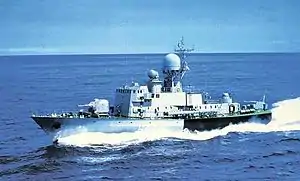Abhay-class corvette
The Abhay-class corvettes of the Indian Navy are the customised variants of the Soviet Pauk-class corvettes. The class was primarily intended for coastal patrol and anti-submarine warfare. Last ship of the class is expected to be decommissioned till 2025.
 An Abhay-class corvette underway | |
| Class overview | |
|---|---|
| Name | Abhay class |
| Operators | |
| Preceded by | Arnala class |
| Succeeded by |
|
| Planned | 4 |
| Completed | 4 |
| Active | 1 |
| Retired | 3 |
| General characteristics | |
| Type | Corvette |
| Displacement | 485 short tons (440 t)[1] |
| Length | 58.5 m (192 ft)[1] |
| Beam | 10.2 m (33 ft)[1] |
| Draught | 3.4 m (11 ft)[1] |
| Propulsion | 2 × Type M 521 diesel engines (16,184 PS; 11,903 kW)[1] |
| Speed | 28 kn (52 km/h)[1] |
| Range | 2,400 nmi (4,400 km) at 14 kn (26 km/h)[1] |
| Complement | 32 (includes 6 officers)[1] |
| Sensors and processing systems |
|
| Electronic warfare & decoys | 2 × PK 16 chaff launchers[2] |
| Armament | |
Description
Abhay class is modified from Pauk II class under Project 1241 PE. The ships were built at Volodarski shipyard in the former Soviet Union. Abhay class vessels are longer, have larger torpedo tubes and improved electronics when compared to the Pauk I class vessels.[1] The ships in the class were named after former Abhay-class seaward defence boats.[1][3]
Abhay class is to be upgraded with Abhay integrated sonar system developed by Naval Physical and Oceanographic Laboratory.[4]
Service history
INS Agray was damaged in 2004 when an anti-submarine rocket fired from the onboard RBU-1200 launcher misfired and exploded on the side of the ship.[5] Following the accident, the vessel was converted into a patrol vessel and a trials ship for electronic warfare systems.[6]
The Ministry of Defence cleared acquisition of 16 shallow water anti-submarine vessels to replace the Abhay class of vessels.[7]
INS Ajay was decommissioned on 19 September 2022 after 32 years of service in the Indian Navy.[8]
Ships of the class
| Name | Pennant | Builder | Homeport | Commissioned | Decommissioned | Status |
|---|---|---|---|---|---|---|
| Abhay | P33 | Volodarski | Mumbai | 10 March 1989[1] | Active | |
| Ajay | P34 | 24 January 1990 | 19 September 2022 | Decommissioned[8] | ||
| Akshay | P35 | 10 December 1990 | 3 June 2022 | Decommissioned[9] | ||
| Agray | P36 | 30 January 1991[1] | 27 January 2017 | Decommissioned[6] |
See also
References
- Commodore Stephen Saunders, ed. (2005). "India". Jane's Fighting Ships 2005-2006 (108th ed.). Coulsdon: Jane's Information Group. p. 320. ISBN 0710626924.
- Commodore Stephen Saunders, ed. (2008). "India". Jane's Fighting Ships 2008-2009 (111th ed.). Coulsdon: Jane's Information Group. p. 333. ISBN 978-0710628459.
- Hiranandani, G. M. (2005). Transition to Eminence: The Indian Navy 1976-1990. Lancer Publishers. p. 44. ISBN 9788170622666.
- "Locally made underwater sensors for Navy". The Hindu. 17 November 2016.
- Bhatt, Arunkumar (8 February 2004). "Damaged ship being towed to dockyard". The Hindu.
- Mazumdar, Mrityunjoy (30 January 2017). "Indian Navy decommissions two ships". IHS Jane's Defence Weekly. Archived from the original on 2 February 2017. Retrieved 31 January 2017.
- "MoD clears Navy plans to get 16 shallow-water anti-sub vessels". The Tribune. 26 September 2013. Retrieved 27 September 2014.
- @IN_WNC (16 September 2022). "INS Ajay (P34) of 23rd Patrol Vessel Squadron, under the operational control of #FOMA, will be decommissioned at Naval Dockyard #Mumbai, on 19 Sep 22, after rendering 32 years of glorious service to the #IndianNavy" (Tweet) – via Twitter.
- "INS Nishank and INS Akshay Decommissioned". Press Information Bureau of India. 3 June 2022. Retrieved 4 June 2022.
